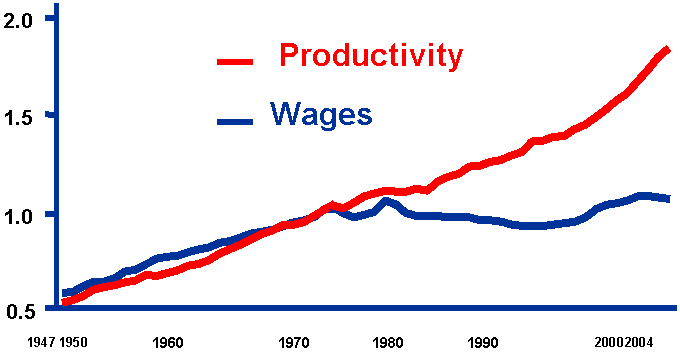| « Dan Hynes Believes in Teachers | Rich Miller on Todd Stroger » |
Labor & Worker Rights Tue Dec 08 2009
Wage Theft Outrage: Broken Labor Law and the American Worker
Reading a recent report on systematic wage theft, and with the unveiling of a "wage theft violator map" by the University of Illinois-Chicago and ARISE, I thought of the strong, negative reaction I've gotten the last few times I've written about the privileges of the well educated.
America, raised on the Horatio Alger archetype and a pop culture focused on the triumph of the individual, aches for meritocracy. So individuals get very prickly when confronted with their own privilege. The fact of our privilege makes us uncomfortable; while race separates us, class engulfs us. Jesse Jackson once said he was ashamed to find that he was relieved when, walking down the street late at night and hearing footsteps, he would turn around and see it was a white man. Perhaps--but what if it had been a black man in Brooks Brothers with a leather valise? What if it had been a Deliverance-style white guy with dirty overalls and no shirt? What if it was a juggalo? As a brown guy, I'm more afraid of juggalos than pretty much anyone else.

The most dangerous game of all
But we shouldn't be ashamed of privilege or disadvantage, and being confronted with it shouldn't evoke anger. There's always someone worse off--and always someone better off. Besides--typically, whatever advantages we have in life are not of our own doing. That's the whole point. A kid born to two doctors and a trust fund should no more try to hide or deny their privilege than a poor kid born to illiterate parents should be ashamed of their situation. The fact that we have little to no control over it is exactly why we should all understand one another. That is where human solidarity starts. With no choice, we're born, and living begins, whether we like it or not. Pretending we all have "equality of opportunity," as libertarian Panglosses do, is just as foolish as pretending that nobody who is successful had to work hard to get there.
That's where we start. Where we go is the obliteration of dependence. Thomas Jefferson once proposed that the state of Virginia seize uncultivated lands and distribute them evenly among the working classes of the cities, that no man should be dependent on any other. The idea of elimination of servitude and dependence was the powerful dynamic of the American Revolution that led directly to the Civil War, the labor movement, the civil rights movements, and innumerable anti-colonial struggles worldwide.
All these fights boiled down in part to this: are we all worthy of protection before the law? Given that we have no choice over our station in life, should justice belong only to those who can afford it? To those who have access to the levers of power? Or are we all brothers and sisters made different only by circumstance, not inherently?
The labor law in this country is hostile to workers and what isn't hostile is unenforced. The result is that millions of Americans don't enjoy equal protection of the law. This makes them an underclass. There is no way to rationalize away the undisputed fact that for a large class of Americans--right here in our city, in rural areas, white, black and brown, men and women--the laws that protect many of us from exploitation and abuse are nothing more than fiction.
This isn't to say employment is by definition exploitative or that all bosses engage in wage theft--only that it is a rampant problem, and that the lack of attention to it constitutes the creation of a subclass of people, denied the equal protection our Constitution and our revolution are supposed to guarantee us.
The study, a collaboration between eleven authors, amounts to an investigation into modern second class citizenship. That the most at risk would be subject to what amounts to billions of dollars of theft every year is unconscionable. For many workers making less than $20,000 a year, more than ten percent of their earned wages are merely taken by those with power over them. For those most vulnerable, losing your job is an economic death sentence. It is exactly that power, enshrined in the doctrine of at-will employment and protected by the dismantling of worker organization in the US, that allows the powerful to steal from the powerless. Shrugging off this kind of illegality is beyond immoral and callous, it is un-American.
The insanity that tells us we should be thankful to have jobs created for us is the mindset that entrenches the absurd doctrine of at-will employment and allows us to treat wage theft as a national inconvenience rather than the organized crime it in fact constitutes. It's a problem for the powerless--not just undocumented workers; the young, the working poor, and workers in industries with traditionally low levels of worker organization. They should be thankful to have any job at all, right? So who cares if their legally mandated meal break was shorter than required by law? They've got a job, don't they?
They aren't as deserving of equal protection. This was a problem that was supposedly resolved by a set of constitutional amendments passed after the last great war against servitude was won. Understand that this is exactly what the lax enforcement of labor law and inhumane immigration laws constitute: a renewed effort to protect existing wealth by classifying groups of people as unworthy of equal protection of the law.
Jobs are not created out of charity. For every job that's created there's an associated profit above the wage. As if that isn't enough, many employers, particularly in the shadowy service and construction industries, go that extra evil mile: stealing from working people.
"The American workplace is governed by a core set of employment and labor laws that establish minimum standards for wages, health and safety on the job, fair treatment, and the right to organize," reads a recent report on ongoing systematic wage theft, "Our findings show that these laws and standards are systematically violated."
The ACLU actually opposed the original comprehensive labor law, the Wagner Act (properly the National Labor Relations Act, or NLRA) because of fears it would put labor at mercy of government. Much maligned former AFL-CIO President Lane Kirkland famously suggested that all the labor laws just be repealed, and labor and management allowed to just go at it. Kirkland was essentially confirming the ACLU's concern; the years since the end of the New Deal had seen a torrent of anti-labor laws and rulings from the courts and the National Labor Relations Board turn what was supposed to be a pro-labor legal regime hostile. Now the labor law regime in this country is undeniably broken.
The champions of laissez-faire have never been shy about calling in the government whenever it suited them, going back to employers using law enforcement and even the armed forces to brutally break worker organizations. Now, in the words of one researcher, briefcases have replaced blackjacks, and Seyfarth Shaw has displaced the Pinkertons.
NSFW, because its from Deadwood
John Galt has always been little more than a child cowering behind the apron of a nanny state forever protecting their little favorite.

Libertarian "Rugged individualism"
The right to organize, an internationally recognized human right and implied by the rights to association and speech in the First Amendment, has been all but extinguished in the US. With that cold hard fact before us, it's easy to see why the rest of the labor law regime--particularly the Fair Labor Standards Act--has become worse than useless, it has become hostile to people who depend on a paycheck to survive. The slop of laws passed by queasy liberals to address unfairness without the unpleasantness of allowing workers to create their own organizations, have contributed to the glut of employment lawsuits, an argument made convincingly by Tom Geoghegan in his book See You In Court. And for the working poor, the failure to either amend these laws to make them fair or enforce the existing laws has allowed a outrageous degree of rights violations to continue unabated. It has wrecked the rule of law and equal protection to the degree that essentially binds millions of Americans into a state of servility.
Wage theft affects workers from all strata: from the well-educated semi-professional to the entry-level service worker. This not about people being asked to chip in and work late to finish a project or skip their lunch to meet a deadline. This is theft. People being denied their legally-protected rights in the workplace. While the working poor are the most vulnerable, they are by no means the only people affected. It's a wonderful trick: the creation of a huge underclass unprotected by law is exactly what makes the masses of American workers--those tens of millions in the meaty part of the income bell curve--insecure and dependent.
"Wage theft" covers a variety of types of violations: sub-minimum wage violations; overtime violations; "off the clock" violations; meal break violations; late pay; illegal pay deductions; and stolen tips. According to the multi-state study "Broken Laws, Unprotected Workers" the numbers of workers that are victims of these crimes could number in the tens of millions. By their estimates, twelve percent of relevant workers are victims of wage theft just in the form of their tips being stolen. This amounts to hundreds of thousands--potentially millions--of dollars being illegally taken every week.
Among low-wage laborers, more than seventy-six percent of workers eligible to receive overtime were denied overtime pay. It begins to add up. Fully eighty-six percent of respondents to the study worked enough hours to qualify for a meal break under law, but were denied that break by being forced work through it or being denied their full break. Maybe you choose to skip your lunch while at work--but what if you were denied the ability to take that break? Would you stand for it? Perhaps you have the leverage to just walk off the job. Surely you understand that many people just don't have that option. That is theft plain and simple.
Is it any surprise our society has become so litigious? Workers thus mistreated know there is little regulatory recourse. Opportunistic lawyers swoop in, torts in hand like lottery tickets. So how many good and decent employers suffer from fear of reckless litigation because of the actions of the unscrupulous? Small businesses can't afford the pricey en-briefcased Pinkertons; for large employers, it's just the cost of doing business. The already powerful prosper. Our uneven labor law regime causes this atmosphere of mutual distrust and fear. And only a small group benefit.
Is the minimum wage outrageous? Is it too high? Given the ever-climbing productivity rate of the American worker and the complete lack of attendant rise in wages, is the minimum wage a privilege? In the apparel and textile industries and personal and repair services, minimum wage violations were in excess of forty percent, meaning forty percent of respondents reported being paid less than the minimum wage. The bosses in these industries need workers to make their profits--because the work may be "unskilled", does that mean the employee has no right to the protection of the law?

The Great Communicator says: 'You're Screwed!'
The enforceable contract is the cornerstone of a free market economy. But unenforced labor law, together with the at-will employment doctrine (which exists only in the US as common law anomaly) means that while contracts between business are eminently enforceable, workers have no guarantees, no peace of mind.
Some cities are considering action to truly criminalize wage theft--to put employers on notice that if they break the law and steal from their workers, the federal government may not be willing to do anything, but local government will. There's no doubt that Chambers of Commerce will rend their garments and howl about hostile populism chasing out business. Think about the argument there: if forced to obey the law, businesses can't operate.
But nobody is below the law. By creating an atmosphere that truly punishes the unscrupulous, we can protect not only workers from jackals, but we can also protect the honest businesses who suffer from a competitive disadvantage from the unequal application of the law, and raise the standards for working people in all strata of the economy.












Philip Rivera / December 8, 2009 9:53 AM
There is another form of wage theft not mentioned in your article. The is the practice of out-sourcing work to another employer-within the U.S.-who will pay their employees less than what the prior employer was paying and provide less health benefits.
Some firms use existing law to create subsidiaries and then out-source the work to the with the same effect as above. What does not change is the work being done.